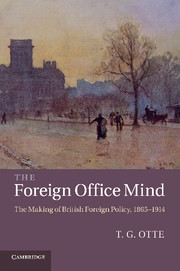Book contents
- Frontmatter
- Contents
- Illustrations (to be found between pages 146 and 147)
- Preface and acknowledgements
- List of abbreviations
- Introduction
- 1 Illusions of supremacy
- 2 The problems of isolation
- 3 Problems of consolidation
- 4 Two Eastern Questions
- 5 The transformation of Great Power politics
- 6 The end of an era
- Conclusion
- Select bibliography
- Index
- Plate section
- References
Introduction
Published online by Cambridge University Press: 07 October 2011
- Frontmatter
- Contents
- Illustrations (to be found between pages 146 and 147)
- Preface and acknowledgements
- List of abbreviations
- Introduction
- 1 Illusions of supremacy
- 2 The problems of isolation
- 3 Problems of consolidation
- 4 Two Eastern Questions
- 5 The transformation of Great Power politics
- 6 The end of an era
- Conclusion
- Select bibliography
- Index
- Plate section
- References
Summary
‘So that’s your Diary – that’s your private mind
Translated into shirt-sleeved History. That
Is what diplomacy left behind
For after-ages to peruse, and find
What passed beneath your elegant silk-hat.
…
But I, for one, am grateful, overjoyed
And unindignant that your punctual pen
Should have been so constructively employed
In manifesting to unprivileged men
The visionless officialized fatuity
That once made Europe safe for Perpetuity.’
Siegfried Sassoon, ‘On Reading the War Diary of a Defunct Ambassador’
For those who share the poet’s sentiments, this book is already too long. Those who take a more detached, possibly even cynical, view of the diplomatic machinations before the Great War may well judge it to be too short. This book is not intended as an exploration of past international relations as such. It does not seek to probe into every nook and cranny of Britain’s foreign affairs in the second half of the long nineteenth century. Neither does it offer an administrative history of ‘the quill-driving life of the F.O.’ and the then still separate diplomatic service. It seeks, instead, to explore an aspect of British foreign policy, to which historians have frequently alluded, but which still remains hidden in the darker recesses of the past: the ‘official mind’.
At its best, diplomatic history has never been the preserve of painstaking plodders who merely chart the waxing and waning of foreign relations, without any pretence at understanding their wider context or significance. It would be a bloodless analysis of diplomatic activity, indeed, that did not trouble itself to relate that activity to contemporary norms of behaviour and contemporary conceptions of what was politically permissible or practically possible. Without taking into account ‘the manner in which contemporaries tried to explain their situation in time and place and … the language and concepts in which such explanations are formulated’ no real understanding of past politics is possible.
- Type
- Chapter
- Information
- The Foreign Office MindThe Making of British Foreign Policy, 1865–1914, pp. 1 - 22Publisher: Cambridge University PressPrint publication year: 2011



